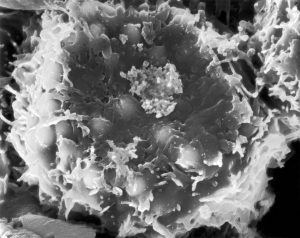Denise Grady in The New York Times:
 Drugs that activate the immune system to fight cancer have brought remarkable recoveries to many people in recent years. But one of those drugs seems to have had the opposite effect on three patients with an uncommon blood cancer who were taking part in a study. After a single treatment, their disease quickly became much worse, doctors reported in a letter to The New England Journal of Medicine. The cases are a sobering reminder that immunotherapy is still in its early days, and can unleash powerful forces that are not fully understood. Patients and doctors are eager to try the treatments when other options have run out, even for cancers in which they haven’t yet been tested. Sometimes those hail-Mary efforts work. But they can backfire. The patients, treated last year at different hospitals, had adult T-cell leukemia-lymphoma, which is caused by a virus. The drug was nivolumab, or Opdivo, which belongs to a class called checkpoint inhibitors. The drugs cost more than $100,000 a year. Nivolumab, made by Bristol-Myers Squibb, has been approved to treat eight types of cancer, but not this type of lymphoma.
Drugs that activate the immune system to fight cancer have brought remarkable recoveries to many people in recent years. But one of those drugs seems to have had the opposite effect on three patients with an uncommon blood cancer who were taking part in a study. After a single treatment, their disease quickly became much worse, doctors reported in a letter to The New England Journal of Medicine. The cases are a sobering reminder that immunotherapy is still in its early days, and can unleash powerful forces that are not fully understood. Patients and doctors are eager to try the treatments when other options have run out, even for cancers in which they haven’t yet been tested. Sometimes those hail-Mary efforts work. But they can backfire. The patients, treated last year at different hospitals, had adult T-cell leukemia-lymphoma, which is caused by a virus. The drug was nivolumab, or Opdivo, which belongs to a class called checkpoint inhibitors. The drugs cost more than $100,000 a year. Nivolumab, made by Bristol-Myers Squibb, has been approved to treat eight types of cancer, but not this type of lymphoma.
…The patients described in the journal were the first three in a nationwide clinical trial meant to test the drug in 20 people with the lymphoma. But after the third got worse instead of better, researchers shut down the study, which was funded by the National Cancer Institute. They wrote to the journal to alert other doctors to the potential risk of giving the drug, a form of immunotherapy, to patients with that type of lymphoma.
More here.
